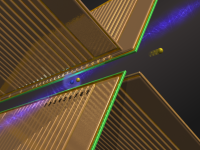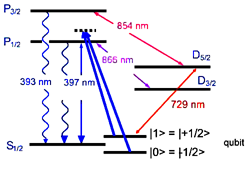Research in Quantum Information
The progress in miniaturisation of electronic circuits within the last five decades caused a revolution in technology that changed nearly eyery domain in our normal course of life. In the meantime, this development reached a state where structures are built up by only a few atoms. So it is not wonder, that quantum mechanics, which is the basic theory on atomic scales, will play a central role in the next technological revolution.


At the moment, basic aspects of laser and transistor technology can be described in a semiclassical way. Quantum mechanics only appear as macroscopic properties but not as a fundamental resource. Furthermore, the miniaturisation of silicon chips and the nanotechnology run against the "quantum border": Fluctuations and the physics of single atoms become more and more important. As a consequence, the further progress on this area will strongly depend on our ability to control small systems. Their coherence properties are conserved and can even be used. The development of applicable methods is one of the main goals of quantum information. An exact understanding of controlling the dynamics of small systems, their many-particle coherence and entanglement as well as ideas for preparation, control and read out are indeed inalienable for technologies in the future and for modern fundamental research. This field includes an enormous broadness from pure mathematics up to practical applications.
At Ulm University, this field is studied very intensely. The research topics of the Institutes of Theoretical and Quantum Physics are theoretically orientated, while the Institute of Quantum Matter is doing experiments. The Institute of Quantum Information Processing works on both theoretical and experimental area.
